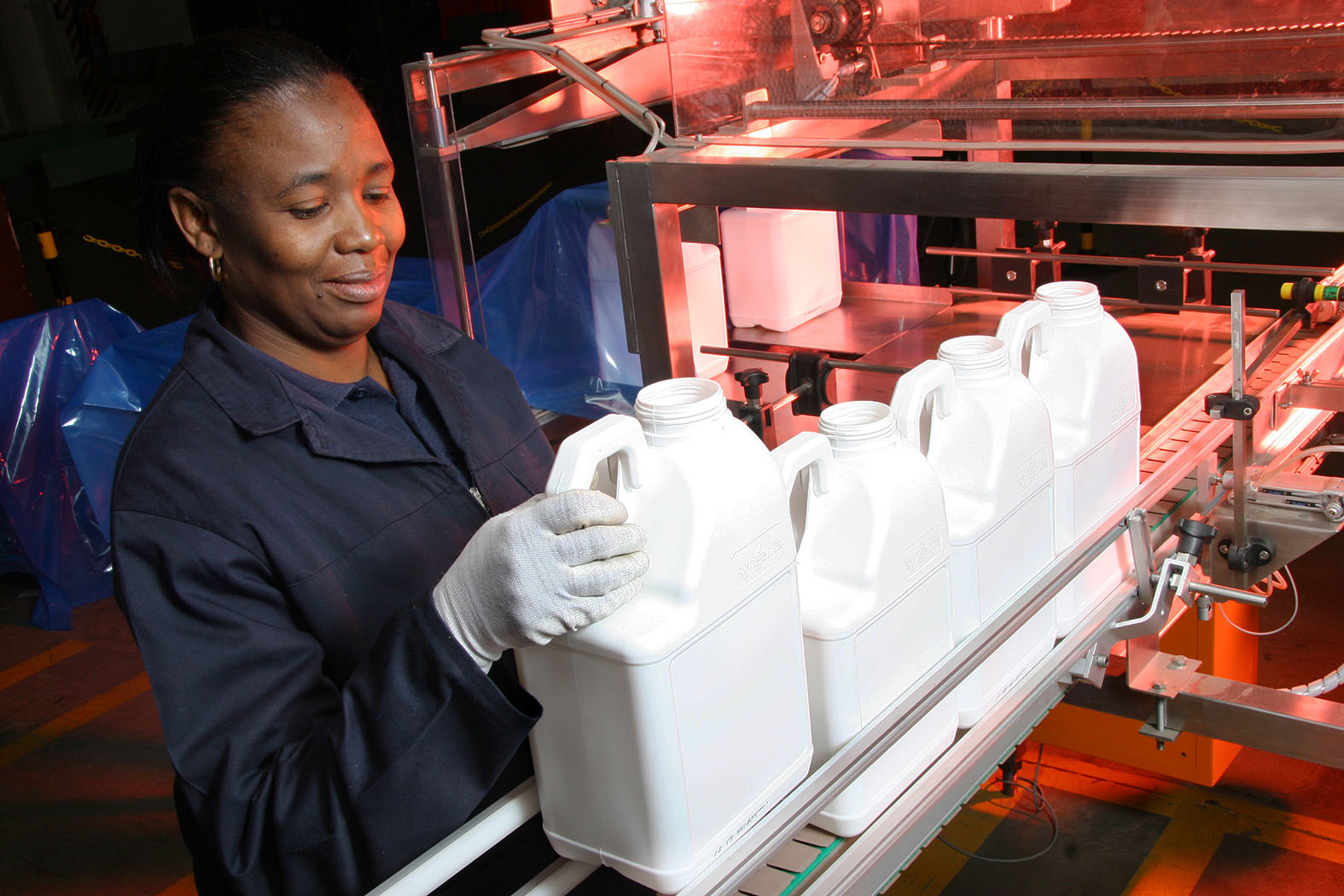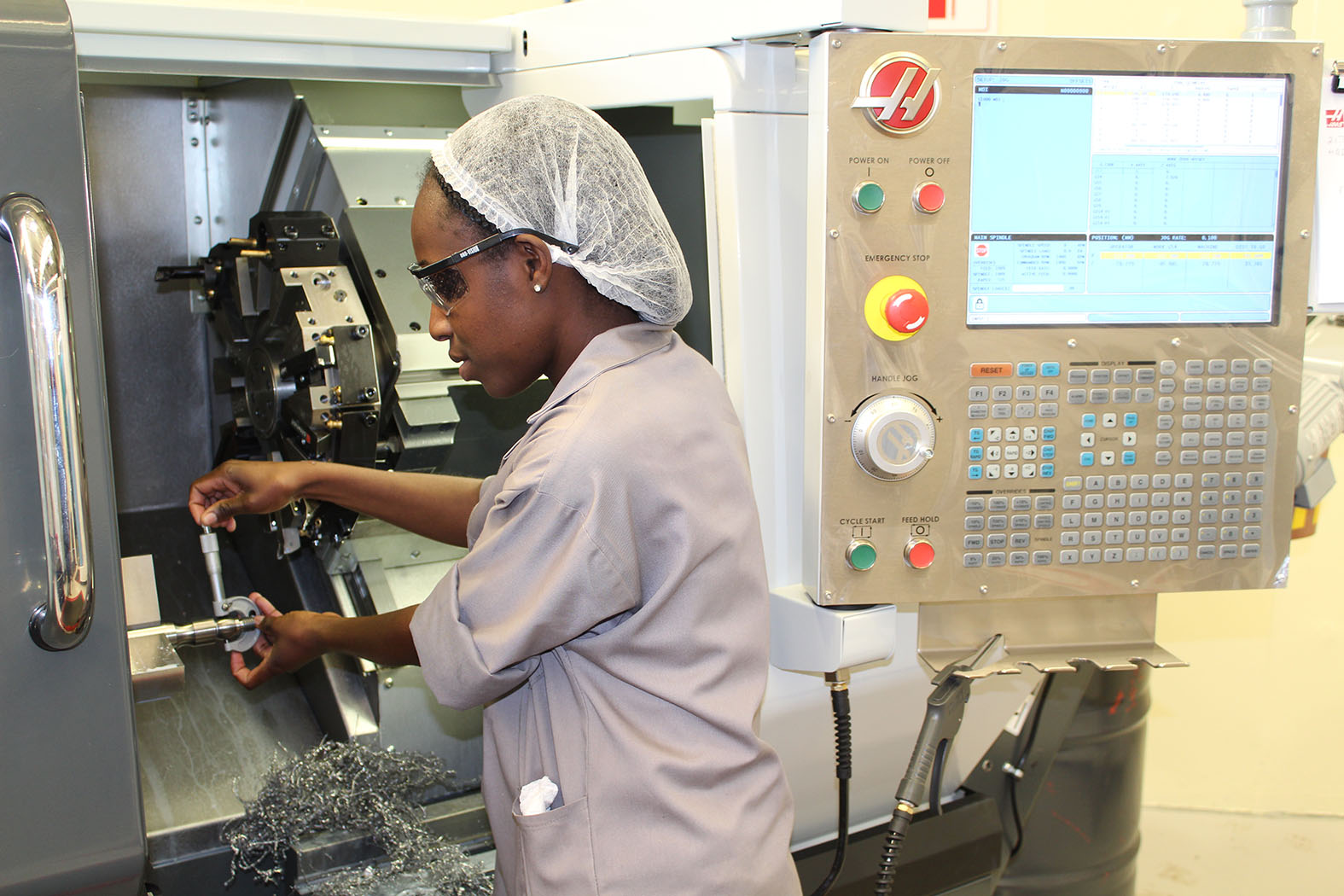Patient undergoing scan at Steve Biko Academic Hospital Nuclear Medicine Department
Sales of radioactive isotopes used in nuclear medicine continue to grow year-on-year, with South African state-owned NTP Radioisotopes SOC group of companies (NTP) now supplying around 20% of global demand for key products. NTP is a wholly-owned subsidiary of Necsa.
NTP has grown its market share in the past year through continued investment in infrastructure, by increasing production and by working with its partners its 2015/16 revenue exceeded R1.2-billion.
Radioisotopes are attached to special chemical compounds that are specifically attracted to the affected organ or organs of interest to your doctor.
Once injected into a patient, the compound selectively becomes attached to or absorbed by the target organ and emits radiation that can be detected by special computerised cameras outside the patient’s body, generating three-dimensional images or scans of the organ.
This procedure allows the physician to determine organ function, and it is often better than using X-ray, MRI, or CT scans, which can only tell the doctor the shape of the organ. Accurate diagnosis is greatly facilitated by nuclear medical imaging techniques because now doctors do not have to wait for the organ to deteriorate first in order to see if there’s a problem.
“Globally, demand for nuclear medicine and medical radioisotopes has shown significant growth over the last decade,” says NTP group managing director Tina Eboka.
“Through investment in infrastructure and increased capacity in addition to good relationships with our supply partners Ansto (Australia) and IRE (Belgium), NTP is well positioned to continue with the reliable supply of quality products to secure the sustainability of nuclear medicine globally.”
Over two-plus decades, NTP has grown into one of the largest and most important producers and suppliers of medical radioisotopes in the world, exporting Mo-99 and related products to 50 countries and is one of only a handful of sites that is able to produce commercial volumes of Mo-99.
The company is also a pioneer in low-enriched uranium (LEU) processes, and NTP together with the Safari-1 research reactor were first in the world to supply commercial all-LEU Mo-99 in 2010. Because I-131, Mo-99 and Tc-99m have such short half-lives, the isotopes cannot be stockpiled and must be constantly produced.
“Over the next five years, NTP’s African growth strategy will focus on three key regions – west, east, and southern Africa, working with in-country nuclear medicine centres and doctors to accelerate market growth and make nuclear medicine technology more accessible to African patients,” continues Eboka.
“NTP is also actively involved with African doctors that come to South African institutions to complete their specialisations in nuclear medicine and our company’s key strategic intent is for these doctors to be our primary opinion leaders when they return to their countries in order to improve the quality of life of patients.
“While a growing number of African countries have qualified nuclear medicine practitioners and a growing demand for nuclear medicine diagnostic and treatment procedures, most countries lack resources and services like radiopharmacies.
“Through its subsidiaries NTP is able to offer a unique value proposition to African nuclear medicine centres and practitioners — radioisotope and radiopharmacy products that are produced in Africa and acknowledged as being among the world’s best and, just as important, on-time delivery of critical radiopharmaceuticals.”
Accelerating medical nuclear technology
Providing a framework to consolidate expertise and implement new strategic initiatives relating to research and development in nuclear technologies in medicine and bioscience, the Nuclear Medicine Research Infrastructure (NuMeRI) is a R900-million initiative partly funded by the national department of science and technology and led by Necsa research and development.
This medical imaging facility will be able to add significant capacity for drug and clinical research and development.
The completed infrastructure will be a distributed network comprising of the Intensity Modulated Neutron Therapy (IMNT) centre at iThemba LABS in Cape Town, the PET Centre for Infection Imaging at Tygerberg Hospital in Cape Town and the main NuMeRI facility to be established at a suitable academic hospital.
“NuMeRI’s effectiveness will be measured in terms of research, innovation and value generation in the form of commercialisable [intellectual property] and enterprise creation. The market proximity that NuMeRI will bring in the pharmaceutical industry is unprecedented,” explains Brian Mphahlele, executive manager: new business development.
It is Necsa’s view that NuMeRI will be a sought-after destination for pre-clinical and clinical screening of new drug entities, which can be performed under one roof, giving local and internationl drug developers a one-stop-shop service.
“Drug development will not be limited to diagnostic and therapeutic radiopharmaceuticals. Of equal importance will be the evaluation of conventional drug candidates such as new antibiotics, TB [tuberculosis] or oncology drug formulations,” says Mphahlele.
“The breakthrough value lies in the ability to rapidly reach drug development go/no-go decisions early on during the translational phase, as well as fast-tracking the development of locus-specific therapies, as in many cancers.
“This represents a huge opportunity to optimise costs by industry. The champions of NuMeRI, Professor Jan Rijn Zeevaart and Dr David Jansen, consulted extensively with principals from academia, public and private sector in formulating this game-changing initiative,” he concludes.
World-class supplier of speciality chemicals

The world reserves of fluorite are estimated at 230-million tonnes, with the largest deposits being in South Africa. Necsa subsidiary Pelchem is the only producer of fluorochemicals in the southern hemisphere, with a portfolio of over 14 products exported to more than 25 countries.
Pelchem, a state-owned company, is a fluorochemical manufacturing hub adding value to South African mined fluorspar through its 30-plus years of experience in the production of fluorochemicals.
“Pelchem is entering a new phase as it prepares for its expansion and growth to position itself as one of the leading fluorochemical producers and suppliers globally,” says Ivan Radebe, managing director.
“Fluorochemicals are essential in everyday life ranging in application from toothpaste to the production of fuel and its use in plastics for storing agrochemicals. Pelchem is well positioned to support the growing fluorochemicals market in the region.”
Pelchem is a critical supplier of hydrofluoric acid to the petrochemical industry, for the production of fuel. Other products include fluorine gas, various fluorine gas mixtures and speciality perfluorocarbons and fluoromonomers to serve such diverse markets as electronics, cosmetics, pharmaceutical, industrial and mining. Pelchem commercialised the world’s first xenon difluoride product.
“Pelchem’s production facilities are operated under patented technology and its proprietary technological capabilities enables growth and expansion of new products to meet complex market needs,” explains Radebe. “We are also the only company in the region capable of safely handling hazardous chemical substances such as hydrofluoric acid and fluorine.
“Pelchem is also the only producer in the southern hemisphere of perfluorodecalin, an anti-aging ingredient used in cosmetics, plays a leading role in the South African Fluorochemical Expansion Initiative and is the sole supplier of hydrofluoric acid to South African refineries for the production of aviation fuel,” concludes Radebe.
Training skilled artisans

Necsa Learning Academy (NLA), was created to contribute towards creating the nuclear technology and manufacturing capability South Africa needs for innovation, global competitiveness and economic growth. The Necsa Skills Development Centre (NSD), run by the Academy, fulfils its mandate in response to the National Skills Development Strategy.
The centre is fully utilised and continues to attract new clients in Africa. NLA provides training interventions for identified learning and development needs and is also the training centre of excellence for nuclear and related industries. It has the Trade Testing Centre that is accredited by the National Artisan Moderation Body (NAMB) and Quality Council for Trades and Occupations (QCTO) to qualify artisans in various engineering trades. Training is offered according to relevant quality standards such as ASME III, ISO, safety, health and environmentally approved programmes.